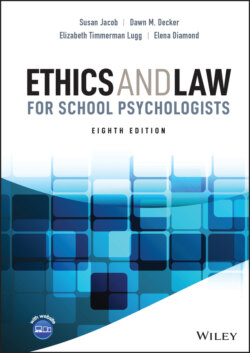Читать книгу Ethics and Law for School Psychologists - Susan Jacob - Страница 50
UNETHICAL CONDUCT
ОглавлениеAs noted previously, one of the functions of professional associations is to develop and promote standards to enhance the quality of work by its members (Chalk et al., 1980). By encouraging appropriate professional conduct, associations such as the APA and the NASP strive to ensure that each person served will receive the highest quality of service. By so doing, the associations build and maintain public trust in psychology and psychologists. Failure to do so is likely to result in increased external regulation of the profession.
Appropriate professional conduct is defined through the development and frequent revision of codes of ethics and professional standards. However,
the presence of a set of ethical principles or rules of conduct is only part, albeit an important one, of the machinery needed to effect self-regulation. The impact of a profession’s ethical principles or rules on its members’ behavior may be negligible … without appropriate support activities to encourage proper professional conduct, or the means to detect and investigate possible violations, and to impose sanctions on violators. (Chalk et al., 1980, p. 2)
The APA and the NASP support a range of activities designed to educate and sensitize practitioners to the parameters of appropriate professional conduct. Both include ethics coursework as a required component in their standards for graduate preparation, and each organization disseminates information on professional conduct on their websites, through publications, and by supporting presentations and symposia. In addition, continued professional training in the area of ethics is required for renewal of the Nationally Certified School Psychologist (NCSP) credential, and many states require continuing education credits in ethics for renewal of licensure (see Rossen et al., 2019).
The APA and the NASP also each support a standing ethics committee. Ethics committees are made up of volunteer members of the professional association. Ethics committees respond to informal inquiries about ethical issues, investigate complaints about possible ethics code violations by association members, and attempt to educate and/or impose sanctions on violators.
